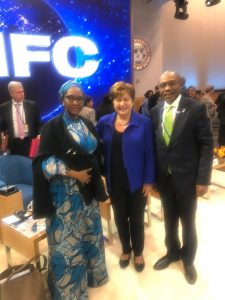There are no products in your shopping cart.
| 0 Items | £0.00 |


NIGERIAN government ministers have been told by the International Monetary Fund (IMF) to keep receipts from all expenditures incurred from the recent $3.4bn loan they received as they will be asked to account for the emergency coronavirus bailout.
On April 28, the IMF approved Nigeria's request for a $3.4bn loan to help ameliorate the effects of the economic collapse brought about by the coronavirus pandemic. On April 6, Nigeria's finance minister Zainab Ahmed, had applied for the loan to help fund the government's 2020 budget after doing so from oil proceeds became impossible.
However, Kristalina Georgieva, the IMF managing director has urged the Nigerian government to keep receipts of all expenditure from the loan. She noted that accountability and transparency were crucial and that it was imperative to retain the trust of people who were experiencing hard times as the coronavirus ravages.
Ms Georgieva said: “One important message we send to everybody and it was indicated in the case of Nigeria as well is, yes, spend because you have to support the economy going over this difficult time, it’s like building a bridge, but keep the receipt. We cannot afford to have accountability and transparency taking back seat.
"I am very pleasantly impressed by how many countries have actually in their letter of intent tell us how they exactly going to make their spending transparent. Very, very important to retain the trust of people who are going through such a difficult time."
She said the IMF expected countries to prioritise health systems and the most vulnerable in society in their spending as stated in their letters of intent. Ms Georgieva added that the IMF wants recipients to use the money to not prioritise health systems but pay doctors, nurses, sustain hospitals and support the most vulnerable people with a social safety net and other programmes.
Under the terms of the loan granted Nigeria, the repayment period is five years, with up to two and half years being a grace period and the interest is 1%. According to Ms Georgieva, the IMF has put in place policy tracking action and is watching the progress each country is making.